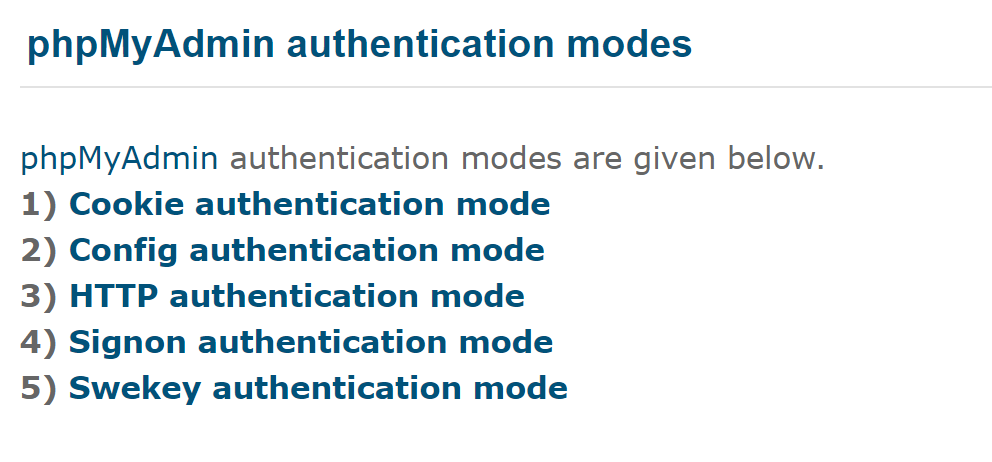
In phpMyAdmin, the authentication type determines how users are authenticated when they try to access the phpMyAdmin interface. This setting is configured in the config.inc.php file of your phpMyAdmin installation, using the $cfg['Servers'][$i]['auth_type'] directive. There are several authentication types available in phpMyAdmin:
config
config: This is the simplest method where the username and password are stored in the config.inc.php file. This method is not recommended for servers accessible from the Internet due to security concerns, as it does not prompt the user for a username or password.

cookie
cookie: This method uses cookies for authentication. The user will be presented with a login screen to enter their username and password. This method is more secure than config and is commonly used for Internet-facing servers.

http
http: With this method, HTTP Authentication is used. The web server manages the login process, and the login dialogue is presented by the browser itself. This method also allows for the use of web server’s authentication modules.

signon
signon: This advanced authentication method allows for single sign-on capabilities. It uses a session-based mechanism and requires additional scripting to integrate phpMyAdmin logins with other application logins.

Choosing the right authentication type depends on your specific needs, including the level of security required and whether the phpMyAdmin installation is exposed to the Internet. For most users, cookie authentication provides a good balance between convenience and security.
Reference
I’m a DevOps/SRE/DevSecOps/Cloud Expert passionate about sharing knowledge and experiences. I am working at Cotocus. I blog tech insights at DevOps School, travel stories at Holiday Landmark, stock market tips at Stocks Mantra, health and fitness guidance at My Medic Plus, product reviews at I reviewed , and SEO strategies at Wizbrand.
Please find my social handles as below;
Rajesh Kumar Personal Website
Rajesh Kumar at YOUTUBE
Rajesh Kumar at INSTAGRAM
Rajesh Kumar at X
Rajesh Kumar at FACEBOOK
Rajesh Kumar at LINKEDIN
Rajesh Kumar at PINTEREST
Rajesh Kumar at QUORA
Rajesh Kumar at WIZBRAND

 Starting: 1st of Every Month
Starting: 1st of Every Month  +91 8409492687
+91 8409492687  Contact@DevOpsSchool.com
Contact@DevOpsSchool.com
